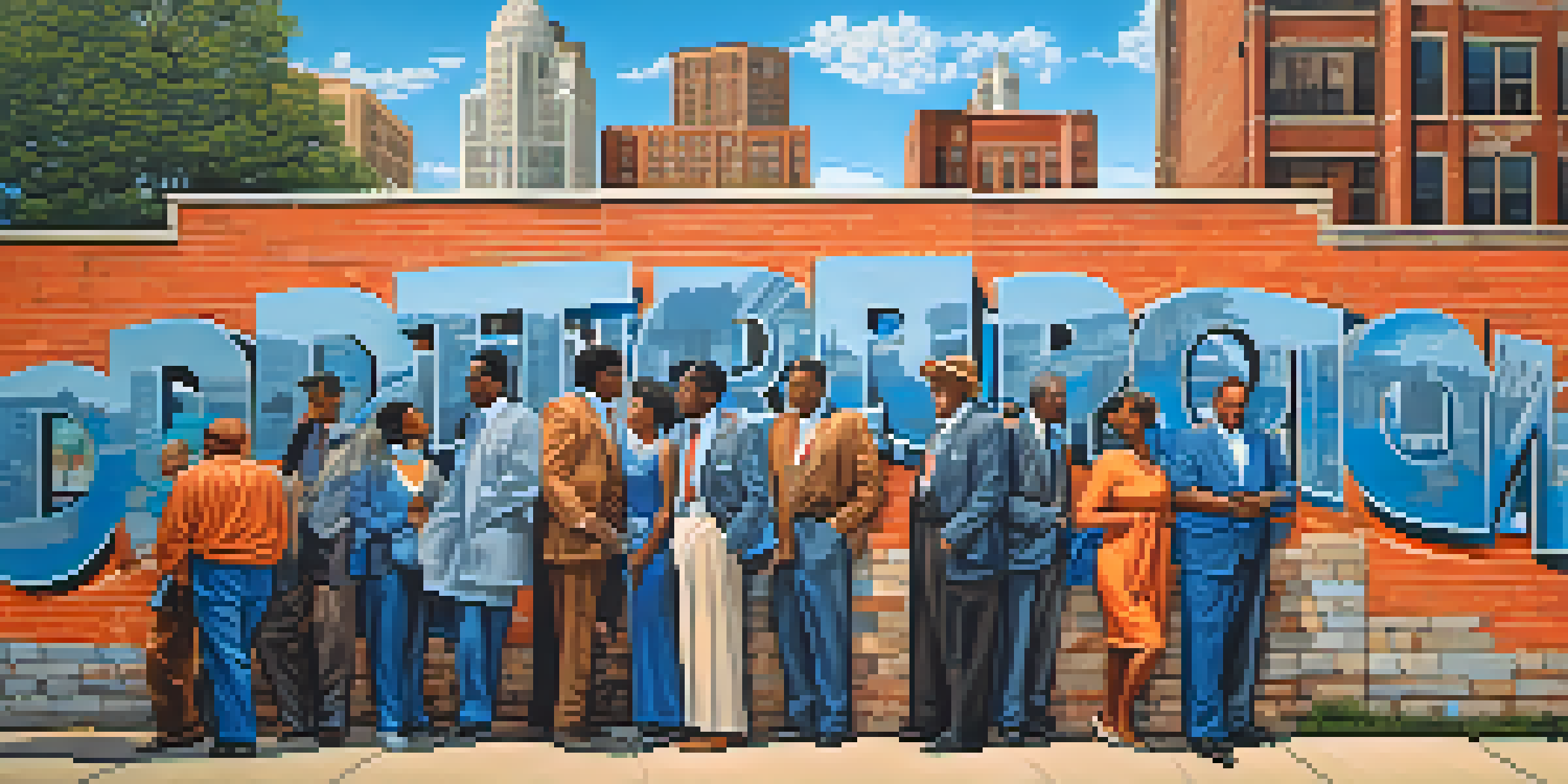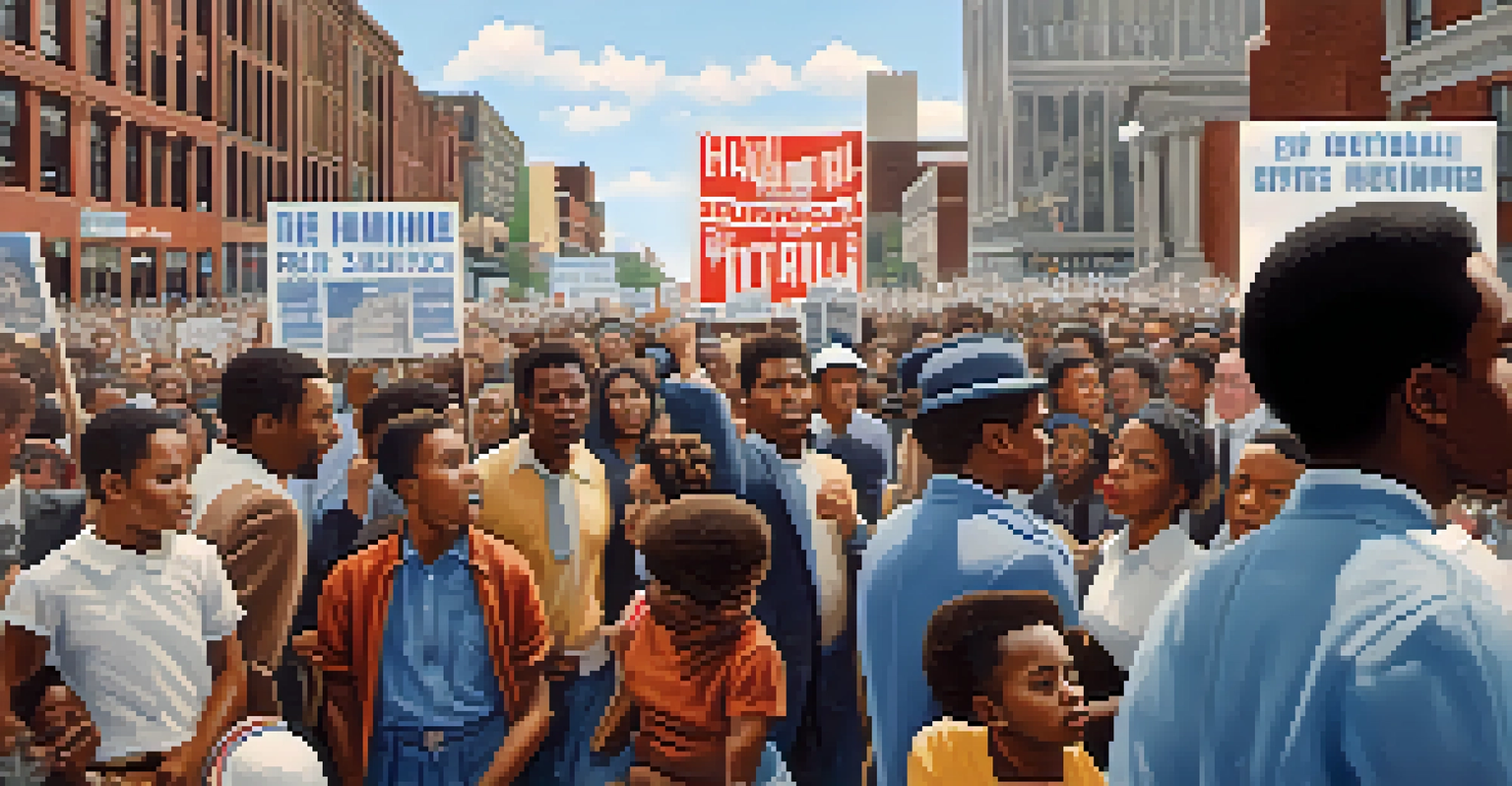Detroit's Role in the Civil Rights Movement: A Historic Fight

Introduction: Detroit's Civil Rights Legacy
Detroit has a rich history intertwined with the Civil Rights Movement, playing a crucial role in advocating for racial equality. The city's industrial strength and diverse population set the stage for significant social change. It became a battleground for justice, where activists fought against systemic racism and inequality.
Injustice anywhere is a threat to justice everywhere.
In the 1950s and 1960s, Detroit emerged as a hub for civil rights activism, with organizations like the Detroit Chapter of the NAACP leading the charge. Activists rallied for voting rights, fair housing, and educational equality, recognizing that change was necessary for future generations. The city's unique blend of labor movements and civil rights advocacy created a powerful force for change.
As we delve deeper into this topic, we will explore key events, notable figures, and the lasting impact of Detroit's civil rights efforts. Understanding this history helps us appreciate the ongoing struggle for equality and justice in America today.
The Role of Labor Unions in Civil Rights
Labor unions in Detroit played a significant role in the Civil Rights Movement, championing both workers' rights and racial equality. The United Auto Workers (UAW), for instance, became a powerful ally in the fight against discrimination, advocating for fair employment practices. Their commitment to civil rights helped to bridge the gap between labor issues and racial justice.

In the 1960s, unions organized marches and rallies that not only highlighted workers' rights but also addressed racial injustices faced by African Americans. This collaboration was essential in amplifying the voices of marginalized communities. By uniting under a common cause, they showcased the intersectionality of labor rights and civil rights.
Detroit's Civil Rights Impact
Detroit played a pivotal role in the Civil Rights Movement, advocating for racial equality through significant activism and community efforts.
The partnership between labor and civil rights activists in Detroit exemplified how collective efforts could lead to meaningful change. Their work not only improved conditions for workers but also set a precedent for future alliances in the fight for equality across the nation.
Key Events: The 1967 Detroit Riot
One of the most significant events in Detroit's civil rights history is the 1967 Detroit Riot, which erupted over racial tensions and police brutality. This tragic uprising highlighted the deep-seated issues of inequality and sparked national conversations about race relations in America. The aftermath led to a reevaluation of policies and practices both locally and nationally.
The time is always right to do what is right.
The riot served as a catalyst for change, prompting city leaders to acknowledge the grievances of the African American community. In its wake, there was a push for reforms in policing, housing, and economic opportunities. This event underscored the urgent need for systemic change and brought national attention to Detroit's struggles.
While the riot was a painful chapter in the city’s history, it ultimately spurred a renewed commitment to civil rights activism. It invigorated community leaders and residents to advocate for justice, leading to significant advancements in the fight against discrimination.
Influential Figures: Activists and Leaders
Detroit's Civil Rights Movement was shaped by many inspiring figures who dedicated their lives to advocacy. Leaders like Rev. C. L. Franklin, who mentored Aretha Franklin, used their platforms to address social injustices through powerful speeches and community organizing. Their charisma and commitment to change inspired countless individuals to join the movement.
Another notable figure is Coleman Young, who became Detroit's first African American mayor in 1974. His leadership was pivotal in promoting policies that aimed to address racial disparities and improve the lives of residents. Young's tenure also emphasized the importance of inclusive governance and community involvement.
Labor Unions and Racial Justice
Labor unions, particularly the UAW, significantly contributed to the Civil Rights Movement by uniting workers' rights with racial equality.
These activists and leaders not only fought for civil rights but also laid the groundwork for future generations. Their legacies remind us of the power of grassroots activism and the importance of standing up for justice in the face of adversity.
The Impact of Education on Civil Rights
Education played a crucial role in the Civil Rights Movement in Detroit, as activists recognized that access to quality education was essential for equality. Schools became battlegrounds for desegregation efforts, with community leaders advocating for equal opportunities for all students. The fight for educational equity was central to the broader struggle for civil rights.
In the late 1960s, the Detroit Public Schools faced significant challenges, including overcrowding and underfunding, which disproportionately affected African American students. Activists organized protests and campaigns to demand better resources and facilities. Their efforts highlighted the connection between education and economic opportunity.
The push for educational reform in Detroit ultimately laid the foundation for future initiatives aimed at achieving equality in schools. By addressing educational disparities, activists aimed to create a more just society for all, emphasizing the importance of education in the fight for civil rights.
Cultural Contributions: Art and Activism
Art has always been a powerful tool for activism, and in Detroit, it played a significant role in the Civil Rights Movement. Local artists, musicians, and writers used their crafts to convey messages of resistance and hope. The Detroit music scene, particularly Motown, became an influential voice for social change, reflecting the struggles and aspirations of African Americans.
In addition to music, visual arts also flourished as a medium for protest. Artists created works that addressed racial injustice, often displaying them in public spaces to engage the community. This artistic expression not only inspired action but also fostered a sense of solidarity among those fighting for civil rights.
Ongoing Fight for Equality
The legacy of Detroit's civil rights activism continues to inspire current movements addressing systemic racism and economic inequality.
The cultural contributions of Detroit's artists highlighted the importance of creativity in advocacy. By using their platforms to raise awareness, they helped to shape the narrative around civil rights and inspire future generations to continue the fight for equality.
Legacy: Detroit's Ongoing Fight for Equality
The legacy of Detroit's Civil Rights Movement continues to influence activism today. Many of the issues that activists fought against, such as systemic racism and economic inequality, persist in modern society. However, the spirit of resilience and determination that characterized this movement remains strong in the community.
Current grassroots organizations carry on the work of past leaders, addressing contemporary challenges and advocating for social justice. They draw inspiration from the victories of the Civil Rights Movement while recognizing the ongoing struggles that require attention. The fight for equality is far from over.

As we reflect on Detroit's role in the Civil Rights Movement, it’s essential to acknowledge that the journey toward justice is ongoing. The lessons learned from this history remind us that collective action, community engagement, and unwavering commitment are vital in the pursuit of equality for all.